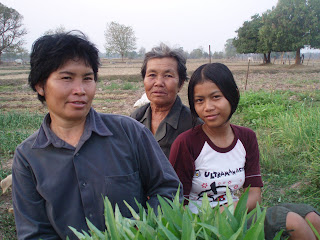
There were no walls- none separating us from the kuay (buffalo), gai (chicken), and mah (dogs) below, nor any walls separating the one giant room in which we all slept, ate, and learned about each other. The only real that existed during my time here was language- and even that melted away quickly.
My Meh and Pah grew up in this village, still living next door to my yaiy (maternal grandmother) with rice paddies squashed in next to each other. Although their location has not changed in years, the scenery looking out into their fields certainly has. Formerly, in yaiy's generation, food was a celebration of life. The primary connection to the land. Grow. Pick. Eat. However, as we learned from Ajaan (Professor) Dave's lecture before leaving for the home stay, the Green Revolution shattered that mentality and families, like mine in Yasothorn, are slowly beginning to revert back to that simple chain of consumption.
About 7 years ago, my Meh was in very poor health and had to go to the hospital frequently. After comparing stories with other CIEE students upon our return to Khon Kaen University, many students found this to be a common lead into answering the question: "Why did you switch to Organic Farming?" My family, like others, made the difficult change to Organic Farming in desperate hopes that their own health would improve as a result.
Since then, not only has the health of my host-mother improved, but in a way the health of their land has grown stronger as well. Due to the Green Revolution Mentality that producing only enough for your family is inefficient and unprofitable, families like mine bought into mono-cropping and particularly in Thailand, the homogenization of rice. Despite a slight profit at first, these practices ultimately stripped the soil of their nutrients and created a system of dependency in which farmers could not get by without government produced fertilizers. These effects and more are what have caused scholars to claim the Green Revolution is the worst thing that has ever happened to the planet.
My meh is proud to say that not only is she in good health, but that "mai chai pboey chemi" or "I don't use chemical fertilizers!" Instead of growing one kind of rice for one portion of the season, my host-family grows a variety of crops and utilizes the fields during wet and dry seasons. While I was visiting, I helped to harvest corn, sweet potatoes, cilantro, lemon grass, bananas, and squash! And when the rains come, the fields will be ready for rice.

This abundance did not come easily, however. Like many farmers switching back to organic methods, the first few years usually bring debt with them. Without the super growing power of pumped up chemical fertilizers, the nutrient-depleted soil does not produce stellar crops for a few years. Without profit, many farmers fall even further into debt from their years of dependency on government subsidized chemical fertilizers. But after two years, most families we exchanged with reported an increase in profits and many have now paid off their debt. 7 years later, and my host father was proud to say "mai mee nee" or "I have no debt."
While in some ways, rural families like mine are moving back towards traditional knowledge and practices, in other ways the rural community structure continues to be challenged. My host-brother, Pepsi, lives in Bangkok (or Glungteb as the Thai say), in part due to the generational lure to the city and in part to find good wages. My younger host sister, Fantah, also plans to leave her village to study to be a nurse. (The names in themselves not so subtly suggest the effects of globalization on rural communities...)
Leaving Yasothorn, one question has remained burning in my head: With traditional knowledge of living off the land finally returning to organic farming communities after years of environmentally irresponsible and impersonal practices, how will this knowledge be sustained if all the younger generations flooding the cities to find work?

3 Generations of Women
Cortney Ahern, Colgate University


No comments:
Post a Comment